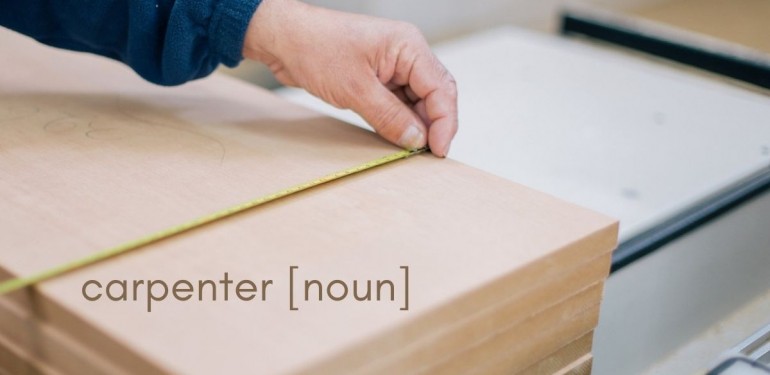
Why is a Carpenter Called a Carpenter?
The title might sound the the start of a bad joke, but have you ever thought about where the names for trades originated? OK, probably not, but we’ve done a dictionary delve for a bit of Christmas fun anyway!
Tradesman
This word first appeared in the English language sometime in the 15th Century and comes from the Dutch/Germanic word ‘trade’ meaning a path or track. While ‘trade’ initially meant a human or animal track, by the early 1500s it was also being used to describe the route of a ship as well as becoming a descriptor for someone’s occupation or way of living. Stick the word ‘man’ on the end and, hey presto, you’ve got someone who trades.
Carpenter
Of Roman/French origins, carpenter comes from the Latin word ‘carpentum’ (meaning a chariot or carriage) and later the Old French word ‘carpentier’ which was used to describe someone who made things from wood. It’s a pretty obvious one, but the slang word ‘chippy’ is thought to refer to the wood chips made by carpenters, although you might be surprised to know that this term dates back all the way to the 1500s.
Plumber
Those wily Romans were the ones who brought proper plumbing to this part of the world, so it’s fitting that the word plumber comes from the Latin ‘plumbum’, which meant lead – so called because the pipes used for these ancient systems were crafted using the material. By the end of the Middle Ages the French word ‘plomier’ came to be used for a craftsman who worked with lead and is the origin of the English word plumber that we use today.
Tiler
The origin of this word get a bit lost in the mists of time, but it seems to derive from the Latin ‘tegula’ and Norman French ‘tieuleor’ which meant to cover something. Like plumber and carpenter, tiler became a surname in the days when people were named after their profession.
Roofer
The early northern European languages like Old English, French, Dutch, German and Norse all used words that looked and sounded very similar to denote the top, ceiling or covering of a structure – ‘rhoof’, ‘hrof’ and ‘roef’ being examples. The ‘er’ tagged onto the end is there to indicate a thing or person that performs and action – so a person who makes coverings for a building became a ‘roofer’.
Electrician
Way back when, those savvy ancient Greeks discovered static electricity by rubbing fur on amber – their word for amber being ‘elektron’. This was followed by the Latin term ‘electricus’ which meant ‘of amber’. The word ‘electric’ was first used in the 1600s, with ‘electricity’ following around a century later. In the latter half of the 18th Century/early 19th Century, the word ‘electrician’ started to appear to describe a scientist who worked with electricity.
Painter
This word turned up as far back as the 1400s when the Latin ‘pictor’ became the Old French word ‘peintour’ which then morphed into ‘painter’ after the English language got hold of it. The original meaning was more in the artist sense than the painter and decorator sense, but it came to describe both professions over the centuries.